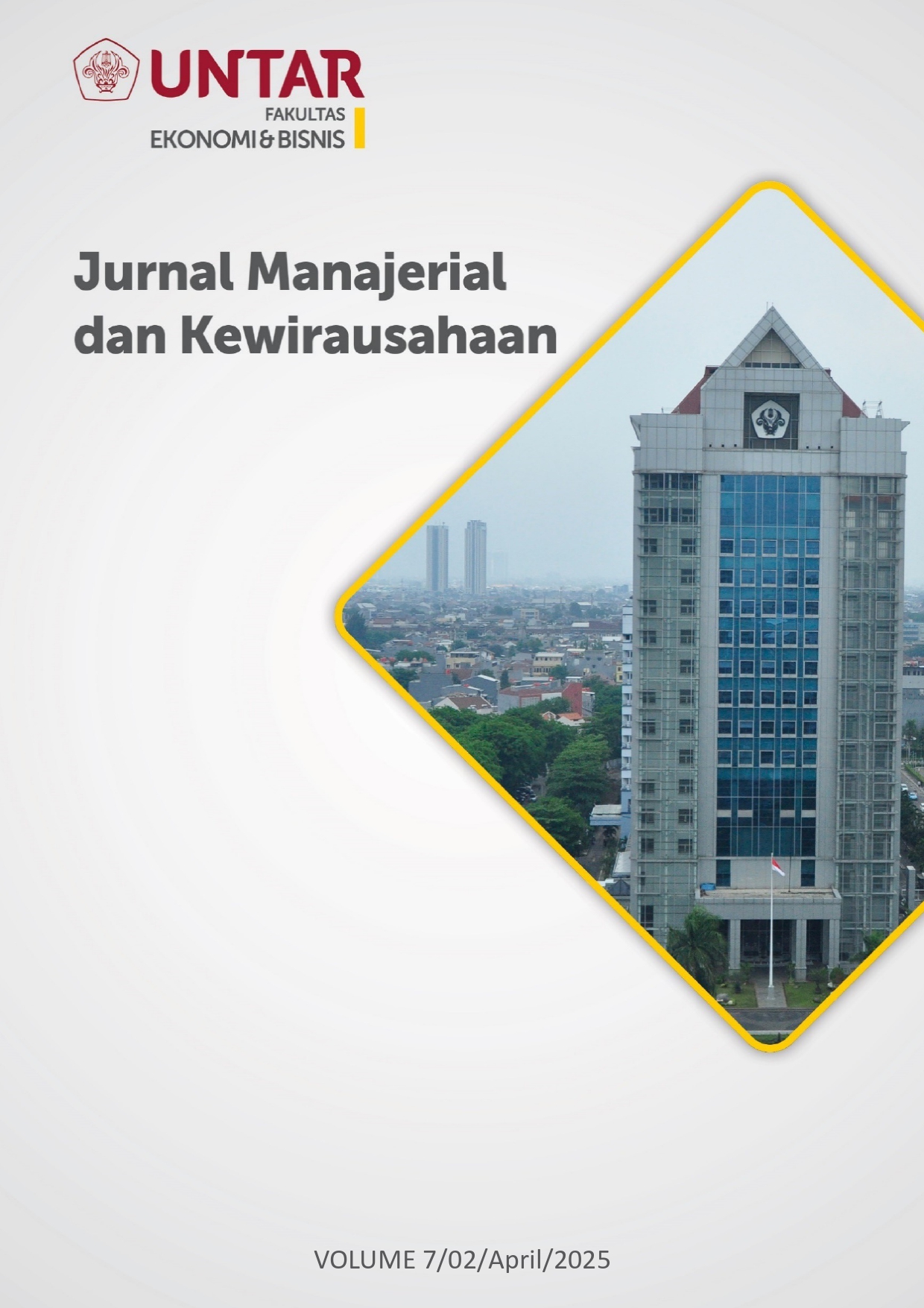Peran Jaringan Sosial, Self-Efficacy, dan Orientasi Kewirausahaan dalam Meningkatkan Kinerja UMKM di Jakarta
Main Article Content
Abstract
The performance of Micro, Small, and Medium Enterprises (MSMEs) is increasingly recognized as an important driver of economic growth in Indonesia. The purpose of this study is to analyze the influence of social networks, self-efficacy, and entrepreneurial orientation on MSME performance. This study is a quantitative study. The population in this study were all MSME owners in Jakarta. The sampling technique used was purposive sampling, whereas sampling was done based on certain criterias. The analysis technique used was SmartPLS 4.0. Based on the results of the data analysis, it can be concluded that in hypothesis 1, the results of the statistical analysis show that the coefficient is 0.205 which means the influence is positive, with a t-value of 2.832, and a p-value of 0.005 which means that social networks have a positive effect on MSME performance, in hypothesis 2, the results of the statistical analysis show that the coefficient is 0.841 which means the influence is positive, with a t-value of 7.382, and a p-value of 0.000 which means that Self-Efficacy has a positive effect on MSME performance and in hypothesis 3, the results of the statistical analysis show that the coefficient is 0.292 which means the influence is positive, with a t-value of 2.666, and a p-value of 0.002 which means that Entrepreneurial orientation has a positive effect on MSME performance.
Article Details

This work is licensed under a Creative Commons Attribution-NonCommercial-ShareAlike 4.0 International License.
This work is licensed under a Jurnal Muara Ilmu Ekonomi dan Bisnis Creative Commons Attribution-ShareAlike 4.0 International License.,/p>
References
Adler, P. S., & Kwon, S. W. (2022). Social capital: prospects for a new concept. Academy of Management Review, 27(1), 17-40. https://doi.org/10.5465/amr.2022.2715
Adrian, E., & Wijaya, A. (2021). Pengaruh orientasi dan edukasi kewirausahaan terhadap kinerja finansial bisnis UMKM di Kota Bogor. Jurnal Manajerial dan Kewirausahaan, 3(1), 1-7. https://doi.org/10.24912/jmk.v3i1.11258
Covin, J. G., & Wales, W. J. (2019). Crafting high-impact entrepreneurial orientation research: some suggested guidelines. Entrepreneurship Theory and Practice, 43(1), 1-16. https://doi.org/10.1177/1042258718773181
Diana, D. (2022). Analisis Faktor Yang Mempengaruhi Kinerja Umkm Di Tangerang Selatan. Jurnal Muhammadiyah Manajemen Bisnis. Volume 3(2).
Ghozali, I. (2021). Aplikasi Analisis Multivariate Dengan Program IBM SPSS 26 Edisi 10. Badan Penerbit Universitas Diponegoro.
Hamel, C., & Wijaya, A. (2020). Pengaruh orientasi kewirausahaan dan orientasi pasar terhadap kinerja usaha UKM di Jakarta Barat. Jurnal Manajerial dan Kewirausahaan, 2(4), 863-863. https://doi.org/10.24912/jmk.v2i4.9865
Hendrawan, A., & Wijaya, A. (2022). Pengaruh dimensi orientasi kewirausahaan dan jaringan usaha terhadap kinerja usaha UKM di Jakarta Barat. Jurnal Manajerial dan Kewirausahaan, 2(3), 577-586. https://doi.org/10.24912/jmk.v2i3.9569
Liekyhung, L., & Soelaiman, L. (2022). Pengaruh orientasi kewirausahaan terhadap kinerja usaha UMKM DKI Jakarta yang dimediasi oleh kompetensi kewirausahaan. Jurnal Manajerial dan Kewirausahaan, 4(3), 731-738. https://doi.org/10.24912/jmk.v4i3.19767
Lumpkin, G. T., & Dess, G. G. (2021). Linking two dimensions of entrepreneurial orientation to firm performance: The moderating role of environment and industry life cycle. Journal of Business Venturing, 16(5), 429-451. https://doi.org/10.1016/S0883-9026(00)00048-3
Mustafa, M., & Khan, A. (2020). The role of social networks in enhancing SME performance: Access to resources, information, and support. Journal of Small Business Management, 58(3), 476-492. https://doi.org/10.1080/00472778.2020.1752769
Ndiege, J., et al. (2021). The role of digital networking in enhancing MSME competitiveness. Journal of Business Research, 124, 452-463.
Octasylva, A. R., Yuliati, L. N., Hartoyo, H., & Soehadi, A. W. (2022). Innovativeness as the Key to MSMEs’ Performances. Sustainability, 14(11), 6429. https://doi.org/10.3390/su14116429
Prasetyo, A., & Wijaya, A. (2019). Pengaruh orientasi kewirausahaan dan orientasi pasar terhadap kinerja UMKM pada bidang kuliner di Pasar Lama Tangerang. Jurnal Manajerial dan Kewirausahaan, 1(3), 383-393. https://doi.org/10.24912/jmk.v1i3.5329
Putri, A., & Lestari, D. (2020). Social networks and competitive advantage: The role of social capital in SME innovation and adaptability. Journal of Innovation and Entrepreneurship, 9(2), 137-152. https://doi.org/10.1007/s13132-020-00521-4
Rasyidi, M. (2021). Pengaruh Orientasi Kewirausahaan Terhadap Kinerja Pemasaran Melalui Keunggulan Bersaing Sebagai Variabel Mediasi (Studi Pada Umkm Keripik Buah Di Wilayah Malang Raya). Jurnal Ekonomi. Volume 1(2).
Raza, S. A., et al. (2019). Entrepreneurial orientation and performance of MSMEs: The mediating role of innovation. Journal of Small Business Management, 56(2), 244-259.
Schunk, D. H. (2022). Self-Efficacy and achievement behavior. Journal of Educational Psychology, 114(4), 754-768. https://doi.org/10.1037/edu0000754
Sekaran, U., & Bougie, R. (2019). Research Methods for Business: A Skill Building Approach. John Wiley & Sons.
Shen, W., et al. (2020). Social networks, information sharing, and MSME performance: A relational perspective. Journal of Small Business Management, 58(2), 300-315.
Smith, J., Brown, L., & Patel, R. (2021). Building trust and reputation through social networks: Implications for long-term business relationships. Journal of Business and Industrial Marketing, 36(5), 643-659. https://doi.org/10.1108/JBIM-11-2019-0401
Suheryanto, F. A. & Ie, M. (2023). The effect of entrepreneurial Self-Efficacy, entrepreneurial attitudes, and the use of social media on SMEs performance. International Journal of Entrepreneurship and Innovation Management, 27(3), 1-18. https://doi.org/10.1504/IJEIM.2023.126583
Susanti, M, & Rahayu, T. (2019). Building trust and reputation through social networks for customer acquisition and retention. Journal of Small Business Strategy, 29(3), 89-102. https://doi.org/10.1080/10770049.2019.1645641
Umarta, S. (2023). Pengaruh Konsep Diri Terhadap Tingkat Kepercayaan Diri Pada Mahasiswa. Madani: Jurnal Ilmiah Multidisiplin. Volume 1(8), 269-278.
Widiastuti, E., & Mahardhika, F. (2021). The impact of social media integration on SME performance: Sales growth and customer loyalty perspectives. Journal of Digital Marketing and E-commerce, 15(4), 210-225. https://doi.org/10.1080/13571516.2021.1938527



